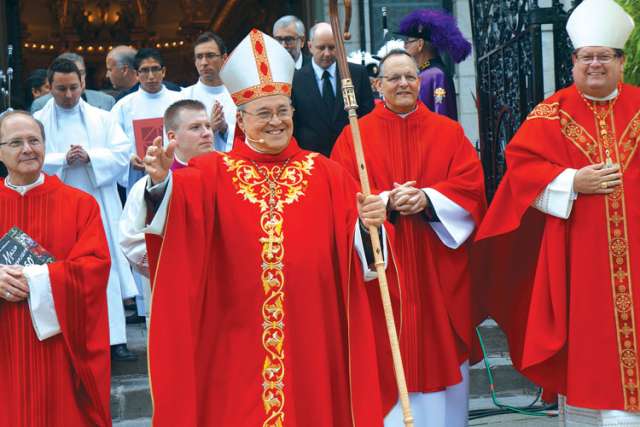Speaking at the Canadian Con-ference of Catholic Bishops annual plenary, the Archbishop of Havana said one way to do that is to “train ourselves through action.”
“People start doing something — they are providing a service in the Church,” Ortega said.
He told the bishops that “training oneself in or through action” helped renew the Church in Cuba before the revolution. He said that lesson still applies today.
Ortega cited a group of young people who would visit a state residence for elderly people. Their efforts attracted the attention of a doctor who worked there. He be-friended the young people, was baptized, had his child baptized and started to come to church, the cardinal said. The doctor eventu-ally became the director of that residence and now every 15 days Mass is celebrated at that facility.
“We have to start, knowing someone is going up a ladder,” Ortega said.
Ortega recalled one woman in his diocese who lent her house for a prayer meeting every Saturday for 12 years. People filled the garden, the garage, the patio, filling every available space. Even more packed in for Holy Week and Christmas, he said. “That family was simply unbelievable.” The community grew to 140 people who went to Mass every Sunday and now have a priest, he said.
“That’s how it starts,” he said. “It starts with this house which is ac-cessible to the neighbours,” he said. “They hear the singing.”
Ortega said that is also the mission for the continent. “It’s going concretely to places in the periphery,” he said.
But so many people are leaving Cuba that “we are constantly starting over again,” he said.
“We cannot — we may not — get tired.”
A day earlier at the plenary meeting, Canada’s Apostolic Nuncio offered the bishops a vision of hope for a missionary Church rooted in prayer and communion.
Archbishop Luigi Bonazzi, who arrived in Canada seven months ago, acknowledged to almost 90 bishops and eparchs the Church in Canada faces challenges after decades of secularization.
He highlighted the precipitous drop in the numbers of those in consecrated life, noting in the 1960s Canada boasted 60,000 religious, while “today, there are little more than 15,000 and their average age is 80 years,” he said.
He added other sources of “anxiety and suffering” for the bishops, including “the shortage of priestly vocations, the aging of the clergy, the weakening of the faith.”
Yet, despite the “alarming portrait” from a statistical perspec-tive, the Nuncio urged the bishops to see the Church as the Holy Spirit sees Her.
“Do we see a troublesome picture before us? Yes! Days, months and years without apparent results? This too! Does the Church seem somehow declining? That also! But all of this is accompanied by the certainty— if we trust in the word of Christ and we cast out the nets — that a miraculous catch lies ahead, the birth or rebirth of a Church more evangelical.”
The Nuncio also stressed the importance of collegiality and communion, not only among bishops but with bishops and their priests and lay faithful. He used the analogy of how our two eyes, with slightly different points of view, allow us to see a three-dimensional perspective.
“Of course, many times it is not easy to harmonize different views; it is tiring to bring together different visions,” the Nuncio said. “However, by oneself, one does not go far.”

